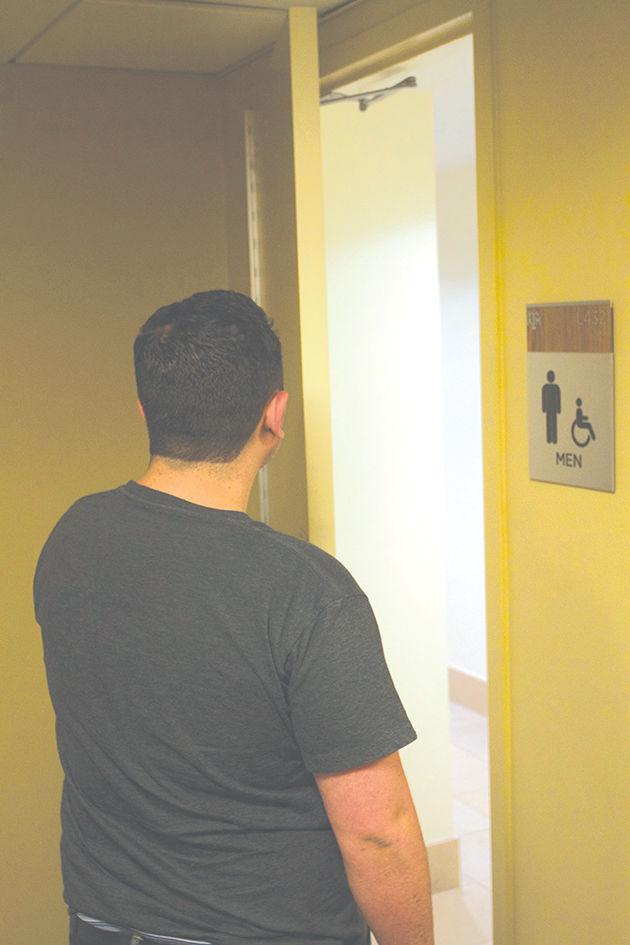Following hours of public testimony extending into the early morning hours of April 20, Texas House Bill 2899 was ultimately left pending by the Texas House Committee on State Affairs.
Although the language of the bill is subject to change, it currently aims to prohibit local governments from enacting measures dealing with protection from discrimination, ensuring that control of such measures is concentrated in the hands of the state government. City and school policies ensuring that transgender Texans are allowed to use the bathroom matching their gender identity would fall squarely within the range of prohibited measures, making bathroom policy a major point of discussion during the committee’s hearing.
The bill has been presented as an alternative to Texas Senate Bill 6, which, in addition to containing restrictions on local ordinances related specifically to bathrooms, would also require people to use the bathroom corresponding with the sex on their birth certificates in government buildings.
“[House Bill 2899] addresses a majority of Texans’ concerns as they relate to our most intimate public places,” said the bill’s author, Rep. Ron Simmons. “It does not prohibit a statewide nondiscrimination policy. What we’re saying is that this needs to be handled at the state level.”
Some Texans expressed opposition to the bill, citing concerns about the elimination of existing local regulations which currently protect the rights of transgender Texans to use the bathroom matching their gender identity in some schools and cities across Texas.
“My recommendation is to continue to allow local governments to fill the gap, to allow those protections for these folks as they have been doing up until this point and not to stand in the way of those protections until the state of Texas is prepared to provide them,” said Glen Hilton, licensed professional counselor from Houston, during his testimony.
Texas Senate Bill 6 passed the Texas Senate on March 14 and has not yet been assigned to a committee in the Texas House of Representatives. While prohibition or invalidation of local ordinances is included in both bills, SB 6 is more narrowly focused on bathrooms and includes regulations on bathroom use in government buildings — including public universities — that would require each person to use the bathroom corresponding to their “biological sex,” or the sex that is printed on their official birth certificate.
In a statement released shortly after SB 6 was filed, the bill’s author, Senator Lois Kolkhorst, said the bill was designed with the personal safety of Texans in mind.
“This is a significant step for the majority of Texans who are alarmed by misguided efforts to shatter our expectations of security and privacy, especially for our children,” Kolkhorst said. “Senate Bill 6 may have my name on it, but the responsibility falls on all of us to protect citizens and ensure that their personal and private rights are secured.”
During the hearing on SB 6, the Senate Committee on State Affairs heard hours of testimony similar to what was heard by the House Committee Wednesday night and Thursday morning.
“During the hearings, a lot of concerned citizens were voicing a lot of opposition to the bill, a lot of people coming out to support transgender rights, but nonetheless I think there was a fear,” said Brittany Perry, instructional assistant professor of political science. “There’s a fear that was perpetuated that people within the transgender community would do some harm.”
Facing opposition from Speaker of the Texas House Joe Straus and a majority of other representatives in the House, SB 6 will likely be stalled indefinitely, according to Lecturer in the Department of Political Science Dwight Roblyer.
“At this point, with Straus firmly in control — and he’s got the strong majority of the republicans on his side as well as the democrats on his side when it comes to this — weirder things have happened, but I would give SB 6 a very slim chance of seeing the light of day in the House,” Roblyer said.
While Senate Bill 6 is unlikely to progress any further, some Texas conservatives have made unsuccessful attempts to carry on the goals of the bill through amendments to existing legislation, according to Roblyer.
“The conservatives in the House, ever since SB 6 passed and it was really clear to them that SB 6 wasn’t going to be considered in the house – at least not anytime soon – have been working like crazy trying to get SB 6-like language in as an amendment to a lot of bills since then,” Roblyer said.
April 18, one day before Wednesday’s House Committee hearing, Governor Greg Abbott expressed approval of the Texas legislature’s recent efforts in this particular area and signaled support for HB 2899.
“I applaud the House and Senate for tackling an issue that is of growing concern to parents and communities across Texas who are now looking to the Legislature for solutions,” Abbott said in a statement to The Texas Tribune. “Rep. Simmons is offering a thoughtful proposal to make sure our children maintain privacy in our school bathrooms and locker rooms.”
However, instructional assistant professor of political science Brittany Perry said the regulations proposed by bills like SB 6 and HB 2899 may be a solution looking for a problem.
“It just doesn’t make sense when you look at the data,” Perry said. “We have states that have protections for transgender individuals to use the bathrooms of their choice and in all of these 19 states we have seen no evidence whatsoever that these protections lead to any sort of increased public safety risk.”
Rather than presenting any kind of danger, transgender people are actually more likely to be the victims of violence and harassment in bathrooms, Perry said.
“The data is very clear that the people who face the most risk in public bathrooms are transgender individuals,” Perry said. “In one study of 27,000 individuals it was found that 1 in 8 transgender adults said they had been harassed, attacked or sexually assaulted in bathrooms.”
In addition to concerns over discrimination, the potential economic impact of bathroom legislation has been a major point of discussion in Texas as well as in North Carolina. According to the Texas Association of Business (TAB)’s statement on March 30, North Carolina saw economic fallout to the tune of $3.76 billion in losses after House Bill 2 — similar in scope to Texas’s HB 6 — was passed.
In the face of this economic pressure, North Carolina ultimately opted for a partial repeal of HB 2, softening bathroom restrictions, but placing a three year moratorium on local ordinances that would regulate private employment practices or public accommodations.
“It remains to be seen whether the enactment of [the partial repeal] in North Carolina will solve the economic woes brought on by HB 2,” TAB said. “That’s why the Texas business community has made clear that discriminatory laws have no place in Texas in the first place. This kind of legislation is risky business.”
Speaking at the hearing Wednesday night, director of industry and government relations for Visit San Antonio, Ashley Harris said her city is already feeling the impact on events and tourism.
“Visit San Antonio had two organizations cancel their events for economic losses of nearly 3 million dollars,” Harris said. “We have 11 additional organization that I update on a near weekly basis who are monitoring this type of legislation to determine if they are going to cancel their event.”
Potential economic woes aside, Chase Brunson, sport management senior and President of Texas A&M’s transgender student group Transcend, said he opposes legislation that would create unnecessary obstacles for the transgender population.
“Transgender people already have enough struggles to worry about in their personal lives,” Brunson said. “Going through transition is a really hard thing, it’s a really big thing, it’s a really expensive thing. They don’t need the extra stress of walking into a bathroom.”










